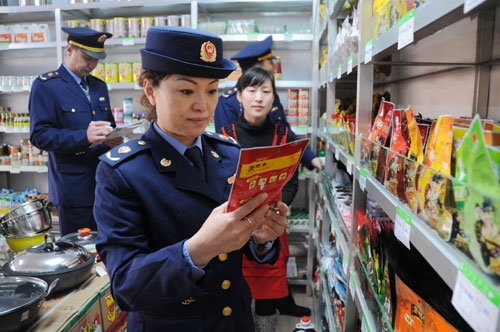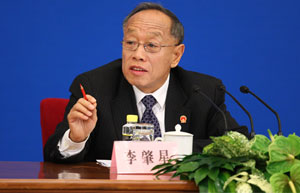Stronger food safety regulations debated
By Zhao Yinan (China Daily)
Updated: 2011-03-10 08:12
 |
|
Inspectors with the commerce authority in Heihe city, Northeast China's Heilongjiang province, examine the ingredients of food in a local supermarket on Wednesday. [Photo/China Daily] |
BEIJING - Lawmakers and experts have urged stronger punishments and improved law enforcement to ensure food safety, following tainted food scandals that have generated nationwide concern.
Wang Lijun, director of the Chongqing public security bureau and deputy to the National People's Congress (NPC), proposed a law on food and drug safety, separate from the current Criminal Law and the Food Safety Law, to stem the rise of such crimes.
| ||||
Wang Lijun's proposal stated the country's current food safety situation requires "heavy and specific penalties", which are lacking in the current regulations and laws.
The proposal also said food safety is a social issue that has confronted many countries in the early stages of their industrialization, and the legislation of a special law on such crimes is in accordance with international experience.
The country's top legislature voted on and approved an amendment to the Criminal Law last month. The amendment raises the minimum penalty for crimes related to the production and sale of tainted food from short-term criminal detention to prison terms of up to five years.
In addition to Wang's proposal, more than 30 lawmakers had earlier this month jointly called for a second inspection tour of food safety law enforcement, following the first tour conducted in September 2009 by the NPC Standing Committee.
The spokesman of the NPC Standing Committee later announced plans for a second inspection tour this year.
Jiang Jian, president of a Shandong-based hospital and a co-author of the proposal, said better implementation of the Food Safety Law is "an arduous and long-term task" and requires efforts from all levels of governments.
But experts said legislation alone is not enough to deal with the food safety issue, which requires "comprehensive changes" within society.
Qu Xinjiu, a criminal law professor at the China University of Political Science and Law, said another inspection tour of law enforcement will be "helpful". However, it might not be necessary to enact a separate law, since the current articles have provided necessary stipulations on such crimes, Qu added.
Peng Jian, a criminal lawyer who represented clients in a tainted milk powder case, explained food safety is related with local and industry interests, which makes law enforcement relatively difficult.
"Melamine was commonly used in the dairy industry for a long time, but the problem was exposed only after it made thousands of babies sick," Peng said.
"It happened because there was a protection mechanism inside the industry."
In 2008, melamine-tainted dairy products killed at least six infants and caused kidney problems in another 300,000 children across the country, official figures show.
Peng also pointed out that holding inspection tours is by no means the only approach.
"It is also essential to ensure a reasonable profit for dairy farmers and reduce role of the middlemen, who try to keep dairy purchasing prices down," he said.







